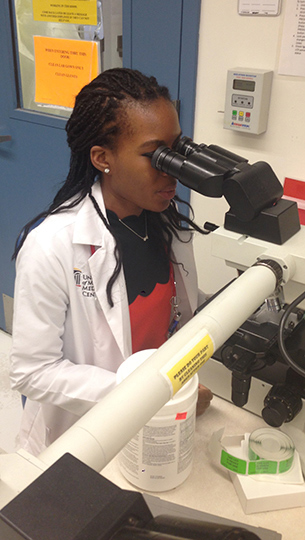Infectious Diseases Fellowship - Microbiology Rotation

Fellows rotates through the UMMC microbiology laboratory for 2 weeks to attain bench level experience in clinical microbiology. This is done as part of a combined clinical microbiology/virology/immunology laboratory rotation including the Clinical Virology Laboratory and the Clinical Immunology Laboratory.
To set up a visiting rotation with the UMMC Infectious Diseases Program, email David Riedel at driedel@ihv.umaryland.edu.
Microbiology Laboratory
The fellow rotates through each work area including bacteriology, anaerobic bacteriology, parasitology, AFB, and mycology. This bench rotation includes formal training by a bench technologist as well as (supervised) applications such as organism identification, antibiotic susceptibility testing, latex agglutination. The fellow is expected to work-up unknowns.
In addition, the fellow is required to attend weekly “plate rounds” throughout the clinical year in the microbiology laboratories where specific clinical cases are presented. Dr. Johnson directs these rounds and they are considered superb learning opportunities. The fellow has contact with the microbiology laboratory on a daily basis throughout the year as clinical cases arise for discussion with the laboratory team.
Clinical Virology Laboratory
The fellow obtains supervised bench training in virus, chlamydia, and mycoplasma inoculation, identification of viral cytopathic effects, and rapid antigen detection techniques for viral identification (immunofluorescence). The fellow is expected to learn proper specimen transport methods, what cell lines are used for viral cultivation, the limitations in tissue cultivation for "rapid" identification of organisms, and what specific immunostaining techniques are available for specific identification. During the clinical year, the fellow interacts with the Virology laboratory as needed in the care of his/her patients.
Clinical Immunology Laboratory
The fellow will observe bench work in flow cytometry to quantitate CD4 and CD8 cells, specific immunologic assays for identification of infections, including ELISA and immunoblots. The fellow learns what these techniques entail, the types of immunoassays that are available for non-cultivatable or poorly cultivatable organisms, and how much time is needed to obtain results, and to get information on their specificity and sensitivity. This information is reinforced and applied throughout the rest of the clinical year with continued laboratory interactions of the fellow and attending during daily clinical rounds, as appropriate.
